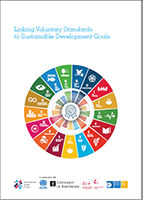
The United Nations Sustainable Development Goals (SDGs) provide our pathway to progress towards 2030 and will be critical in allowing us to "build back better" after the global pandemic. This will require smart partnerships between the public and private sector where the focus must be on supporting responsible social, environmental and economic practices in the pursuit of sustainable and inclusive growth.
Voluntary sustainability standards (VSS) are currently at the centre of the approach of businesses to sustainability. Going beyond minimum legal standards established by governments, VSS focus on reducing adverse environmental and social effects and responding to the demands of various stakeholders, including consumers.
Using original data, the present report tracks the extent to which sustainable practices promoted by voluntary standards align with the SDGs. This innovative research provides a clear picture of how the private sector can work towards the SDG targets by adopting voluntary sustainability standards. It documents the overlap between existing VSS standards and the SDG targets and identifies further potential to better align VSS with additional sustainable development goals.
The report demonstrates that policymakers can select from a large number of relevant voluntary sustainability standards – at country and sectoral levels – to contribute to the SDGs.
These insights are especially valuable for developing countries in their drive to for a future growth trajectory that is more sustainable and inclusive. Understanding the links between voluntary standards and the SDGs contributes to efforts to build a more resilient business ecosystem, create greener jobs, and build the business case for micro, small and medium enterprises (MSMEs) to adopt greener technologies. At the United Nations, we have emphasized the alignment between competitiveness, sustainability and inclusiveness as a means to maximize economic and development impact.
This report supports and builds on that approach. Increased understanding of how voluntary sustainability standards can connect with the 2030 Sustainable Development Agenda makes it possible to widen and advance the effort to meet the SDGs, especially given that we have just under ten years to reach our goal.
This project was the result of successful collaboration between ITC, UNCTAD, the European University Institute, the German Development Institute and the University of Amsterdam. We trust that the findings in the report will be a useful resource for standard-setting organizations, policymakers, suppliers and lead firms as they strive to bring together the public and private sectors and promote sustainable and responsible supply chains in pursuit of the Sustainable Development Goals.





